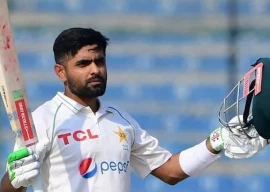
In the absence of India, who controversially refused to send a team to Guangzhou, the established Asian trio would normally be certainties to flesh out the medals podium.
But Afghanistan, who have never won an Asian Games gold in any event, see this tournament as their breakthrough moment, a belief fired by their remarkable climb up through the global cricket rankings.
That has seen them make the World Twenty20 finals and just miss qualifying for the 2011 World Cup at their first attempt.
A sense of burning injustice also drives Afghanistan with the Asian Games the first tournament to be held since the International Cricket Council decided that the 2015 World Cup will be cut to 10 teams.
That would seriously compromise the chances of any second-tier Associate member performing at the showpiece event.
Afghanistan have brought an experienced squad to China although they have named all-rounder Mohammad Nabi as new captain in place of Nawroz Mangal.
Team manager Nazijar Abdul Rahimzai said the change in leadership was unlikely to affect Afghanistan's campaign.
"Mangal and Nabi are still close friends and every player is participating regularly in the training," said Rahimzai.
Afghanistan also boast a wily coach in the shape of former Pakistan Test star Rashid Latif.
Pakistan, Sri Lanka and Bangladesh have had to send second-string teams to China, a consequence of the packed international Test and one-day calendar which confronts all top nations.
Pakistan, whose marquee names are currently playing a Test series against South Africa in Abu Dhabi, are skippered by 24-year-old batsman Khalid Latif who has played in five one-day and five Twenty20 matches.
With a home series ongoing against West Indies, Sri Lanka too have had to mix and match with Test players Jehan Mubarak and Nuwan Zoysa likely to be key figues.
Bangladesh have named the experienced Mohammad Ashraful, who has played 55 Tests and 159 one-day internationals, as captain as the country looks to win a first ever Asian Games gold.
Cricket's relationship with the Asian Games has been brief but colourful and controversial.
India's absence helped to put a question mark over its place in the next Games at Incheon in 2104 before a compromise deal between the Olympic Council of Asia, aware of the sport's commercial muscle, and Korean organisers was struck.
Once that issue was resolved, Guangzhou saw Pakistan take the first women's gold medal with a comprehensive 10-wicket win over Bangladesh while China's team made the semi-finals.
In the men's event, Pakistan, Sri Lanka, Bangladesh and Afghanistan all go straight to the quarter-finals with China, Malaysia, Nepal, Hong Kong and the Maldives battling to fill the other four spots.










1729235456-0/Untitled-design-(2)1729235456-0-270x192.webp)


1734946202-0/Express-Tribune-(6)1734946202-0-270x192.webp)
1732012115-0/Untitled-design-(14)1732012115-0-270x192.webp)
1734899716-0/image-(15)1734899716-0-270x192.webp)







COMMENTS (1)
Comments are moderated and generally will be posted if they are on-topic and not abusive.
For more information, please see our Comments FAQ